Four takeaways from GAIN 2019
‘Make GAIN 2019 a personal audit’
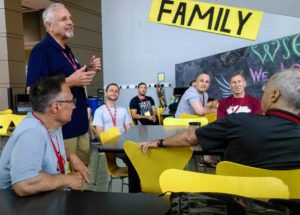
were the opening remarks from Vern Gambetta at the GAIN conference in Houston last week. He set out a vision for the conference that I took to heart.
- What are you currently doing?
- What do you want/need to do?
- Gap analysis: what is necessary to close the gap?
I have some personal reflections and tasks to do as a result. Below are some more general points that may be of interest.
1. Decision Making: Len Zaichkowsky
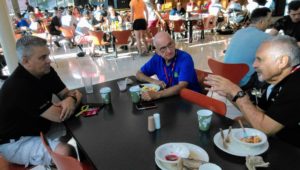
The author of ‘The Playmaker’s advantage’ talked about developing excellent games players. The performance separators between the good and the great were an athlete’s ability to:
- Search for cues.
- Decide quickly and accurately.
- Execute flawlessly.
As coaches, we need to then design practices that help develop these qualities. Len called it ‘Overspeed training for the brain.’
Tight area drills and small sided games are two ideas that can be used.
If you remove thinking and decision making from the players in training, how can you expect them to produce on the field?
2. A Hard Look at Evidence: Dr Grace Golden
‘The path to informed expertise and reasoning is not certain, it’s a journey.’ Grace is an Athletic Trainer and course leader at Oregon University. She crammed 3 hours of information into a one hour seminar which was enlightening.
She gave an overview of definitions of evidence, and how we can gather it to inform and improve our practice. In the UK there is much talk of ‘Evidence based practice’ which is usually interpreted as ‘Only do it if you read it in a journal.’
This has never sat well with me, because my own observations, reflections and feedback from athletes that I coach have influenced me as much (if not more) than studies I have read. Of course, if I only rely on my eyes, I am subject to bias.
Grace said we need to filter the evidence to counter this bias. She gave a hierarchy of evidence, with randomised controlled trials (RCTs) at the pinnacle.

However, due to ethics and logistics, RCTs may be unsuitable or unfeasible. She gave the example of studying the efficacy of using parachutes when jumping out of a plane.
Who would want to be in the control group that didn’t get to use the parachute? There has been no RCTs studying parachutes, but we all agree that they are a pretty good idea.
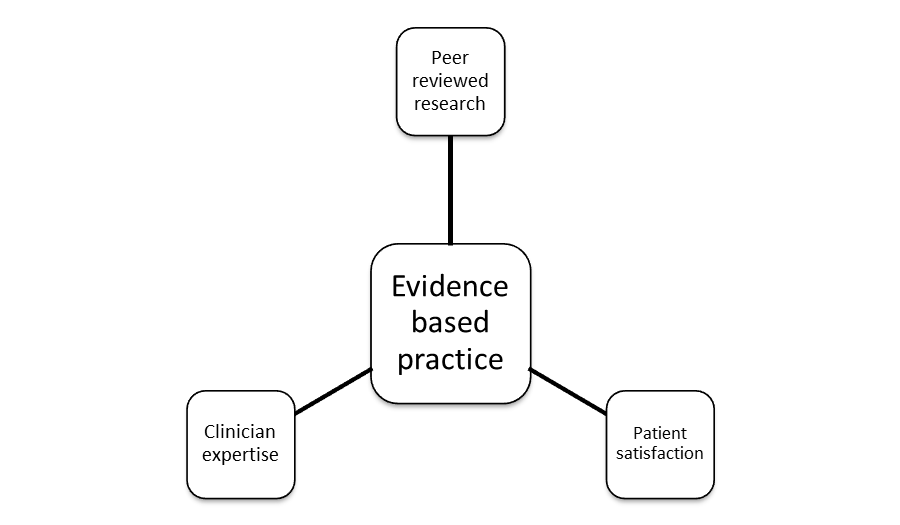
Grace showed how medicine has moved from evidence based practice to evidence informed practice.
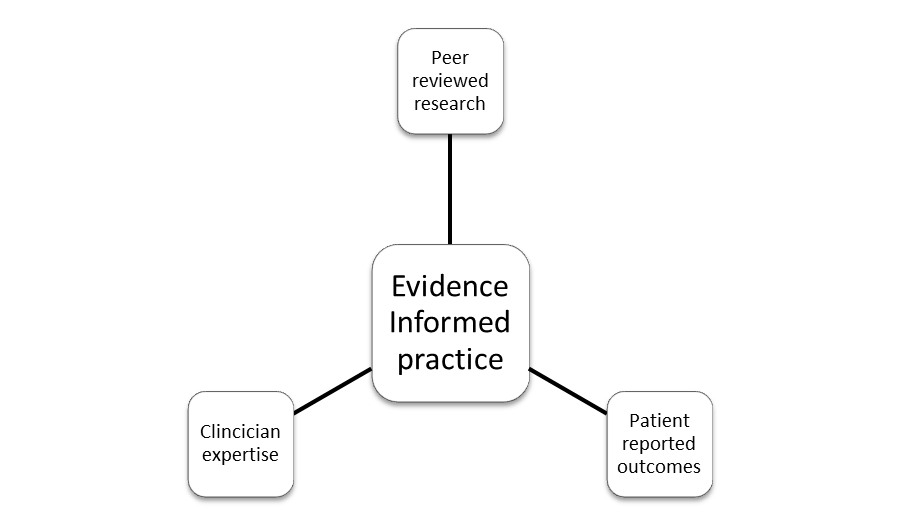
The assessment, treatment and then reassessment of interventions lead to informed practice. ‘Evidence doesn’t make decisions, clinicians do.’ Haynes (2002).
Grace then spent some time on the art of questioning. She said that informing yourself is not about acquiring knowledge. We are drowning in data (or funky exercises). Increased knowledge can make us more ignorant. We ignore what we see and hear in front of us.
A key point was to question our questions. Allow athletes the time to question us and for us to think and respond.
3. Planning: John Kiely and Eddie Jones
‘The plan is the outcome of the process, not the central part.’ John Kiely.
Several of the presenters mentioned planning. What was interesting was that all looked at it as more of a framework, rather than a detailed, longitudinal work.
John was talking about rethinking adaptation and gave a detailed critique of Selye’s work on stress adaptation and how it had been appropriated for sports. The periodisation concept puts the plan at the heart and centre of what is being done with the athlete.
John suggested a different approach.
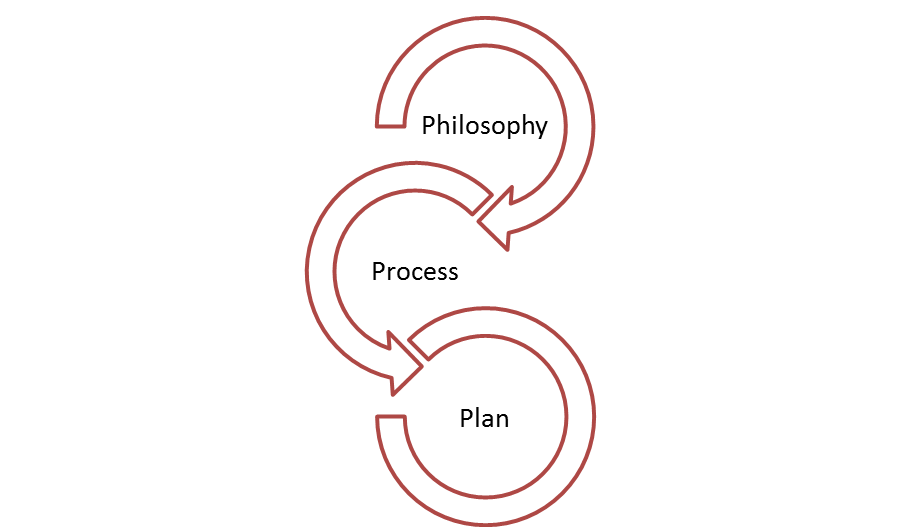
- Philosophy: The coaching teams; belief system, created by the blending of critical analysis of evidence, experiences and opinions (See point 2).
- Process: The set of linked actions designed to track, analyse and review relevant information (lots of ways of doing this) from coaches and players and other sources.
- Plan: The training detail emerges from the process outputs and the hard constraints imposed by logistics and competitive schedules.
John likened the detailed planning as kind of like writing a letter so Santa. It is more of a soother for coaches, than something that is likely to happen. (Gary Winckler said something similar here).
Rant alert:
My #1 bugbear when working with NGBs is being asked to send my ‘Annual periodised plan’ to a spotty youth straight out of University without any idea of what the coaches are doing, or what the players do outside of my sessions. It is a total fiction and a waste of my time. It does allow the spotty youth to ‘show nice graphs’ to justify their job.
Rant over.
Relying too much on the plan can reduce your agility. Planning isn’t an excel spreadsheet and we need to move away from thinking that a good programme is a well- executed plan. This was an excellent seminar.
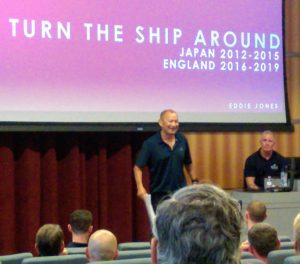
Eddie Jones gave an overview of some of the things he has done with Japan Rugby and now England Rugby. He said that you have ‘Got to plan and get on with it,’ and that ‘It’s better to have a good plan today than an excellent plan tomorrow.’
Working within the confines and pressures of International fixtures are examples of the ‘hard constraints imposed by logistics and competitive schedules.’ John mentioned.
Eddie said that as a head coach it is important to plan, but don’t get fixated. Don’t let tradition suffocate you. ‘Traditional thinking stops you from changing. It takes COURAGE.’ to try something different.
‘You can’t love something if you are copying something else.’ Eddie was very keen on infusing the plan with passion and purpose.
4. Selling the message to players: many presenters.
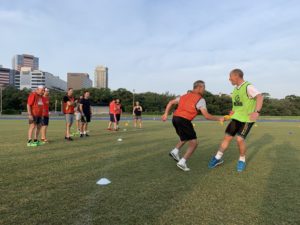
My personal bias maybe meant that I was tuning into any tips on how to present evidence or explain the purpose of what we do and why to the athletes I coach. But, many of the presenters did mention this.
Grace Golden suggested sharing your verbal pitch with athletes. Draw a picture of what you are trying to achieve. She said that not empowering the athlete to engage in the process was a mistake. They need to have a voice.
Greg Gatz showed his ‘Carolina Performance Newsletter’ and communication noticeboard at the University Of North Carolina. He uses these to share success stories and create buy in.
Bill Knowles talked about ‘Inspiring stories of world –class recoveries by average athletes’ was as important as stories of world-class athletes.
John Kiely shared four points from science that underpins the art of coaching:
- Build Awareness: Education (gradually).
- Signal competence (with humility).
- Build belief and promote expectation.
- Consciously design processes, environments and messaging.
- Be YOU, but your best possible You (don’t be a charlatan).
John said that people respond to signals of competence, so think about your communication very, very clearly.
Eddie Jones talked about creating a vision and making the athletes feel part of something special.
Len Zaichkowsky said to treat your clients like gold and have your passion be contagious.
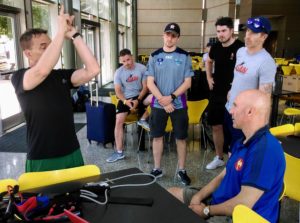
Vern Gambetta said that ‘Culture is the greatest scalable opportunity for a competitive advantage.’
This last section is something I shall be developing at our club over the next couple of months.
Summary
Many people ask ‘What is GAIN?’ The headline speakers draw new people in; they are an eclectic bunch, with new speakers from different fields each year.
However, the reason I returned for an 8th time is the quality of attendees. The chance to share ideas and learn from professionals from many different countries, disciplines and sports is unique. I know that if I have a problem or an idea, then I can get in contact with one of the people I have met at GAIN and get an expert answer.
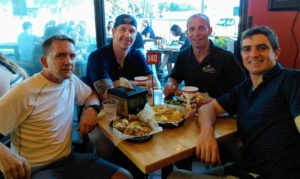
Some of the best people you have never heard of gave me food for thought, so thanks to everyone who sat by me at meal times, or was training at 0530 in the morning with me.
I am looking forward to helping our athletes over the upcoming months, helping other coaches on our coaching courses.

Thanks for this summary James! Your are an important piece in GAIN, always helping and taking care of others.
Vicen
Thanks Vicente- no more important than anyone else. We all do our bit- your book summary was excellent.
Excellent recap, James! Appreciate all your insights and thought provoking questions throughout the week. I hope to see you again next year, and on the pitch in the mornings!
Thanks Andrew, only my thoughts of course, everyone got something different. I still think 0530-0630 is when I gain the most.